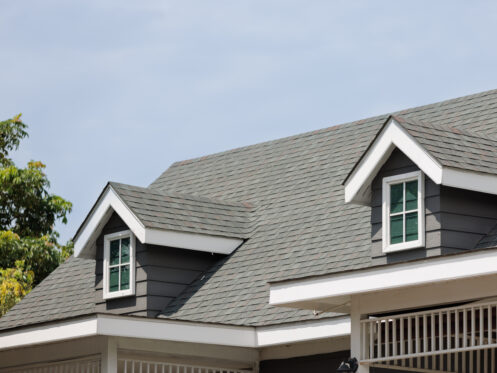When it comes time to choose a roofing material, homeowners have many options. Often, they narrow those choices down to asphalt or metal. Both offer distinct advantages depending on your climate, home design, and budget.
At Schmidt Roofing in Arlington, MN, we install, maintain, and repair both asphalt shingles and metal roofs. Before you commit to either, it helps to evaluate them and understand the differences. This guide outlines key differences in lifespan, maintenance, performance, and more.
Lifespan and Durability
One of the most significant differences between asphalt and metal roofing is longevity. With proper care, asphalt shingles typically last up to 30 years. Architectural shingles may last slightly longer, but all asphalt options gradually degrade from wind exposure, UV rays, and granule loss.
Metal roofs, on the other hand, can last up to 70 years. Steel, aluminum, and zinc panels resist cracking, corrosion, and impact. Many metal roofs also feature protective coatings that extend their life span. These materials withstand snow, heat waves, and—when installed to proper wind ratings—even high-wind hurricane conditions. If longevity is a top priority, metal roofing has a clear edge.
Maintenance Requirements
Maintenance is important for both materials, but the needs are different. Asphalt shingles require annual inspections, especially after storms. As shingles age, they may become brittle or lift, reducing protection.
Metal roofing tends to require less maintenance. It resists mold, algae, and weather-related wear and tear. With proper installation and basic upkeep, a metal roof can last for decades with minimal repairs. For homeowners who prefer fewer ongoing expenses, metal roofing is an appealing option.
Installation Differences
Asphalt shingles are relatively simple and fast to install, especially on homes with uncomplicated rooflines. In many cases, we can complete the job in one to two days.
Metal roofing, however, is more technical. Installation requires special tools, precise measurements, and expert flashing techniques. Standing seam and custom panel systems may take longer and cost more in labor. While the upfront investment is higher, the long-term performance often makes it worthwhile.
Energy Efficiency and Insulation
Asphalt shingles, particularly in darker colors, tend to absorb solar heat, which can raise attic temperatures. Some shingle brands offer reflective coatings to help reduce this effect, but overall, metal is the more energy-efficient choice.
Metal roofs reflect solar radiation, especially when coated with reflective pigments, which can reduce cooling costs in the summer. They also shed snow efficiently in winter, which helps prevent ice dams and lessens the load on your insulation. For homeowners focused on efficiency and year-round comfort, metal roofing offers stronger performance.
Cost Considerations
Asphalt shingles are more affordable upfront. Material and labor costs are lower, which makes them attractive to homeowners with tight budgets.
Metal roofing costs more initially. However, it offers greater durability, reduced maintenance, and fewer replacements over time. Homeowners who plan to stay in their home long-term often find that metal is more cost-effective in the end.
Appearance and Design Options
Curb appeal matters, and both options offer visual flexibility. Asphalt shingles have a traditional look and come in a wide range of colors and textures. They’re especially common in neighborhoods where HOAs favor uniformity.
Metal roofing offers a more modern or high-end aesthetic. Panels come in styles like standing seam, corrugated, or metal shingles designed to mimic slate or tile. With a wide selection of coatings and colors, metal roofs work well for custom, farmhouse, or contemporary homes.
Performance in Severe Weather
Asphalt shingles perform well in typical weather but can be vulnerable to hail, high winds, and snow accumulation. Improper installation or aging shingles increase the risk of damage.
Metal roofs provide better protection in harsh climates. They can withstand wind speeds up to 140 mph and offer superior resistance to hail and fire. Because metal is non-combustible, it’s also ideal in wildfire-prone areas.
Environmental Impact
Eco-conscious homeowners often consider sustainability. Asphalt shingles are petroleum-based and are not widely recyclable. Most removed shingles end up in landfills, although some manufacturers now offer limited recycling programs.
Metal roofing is highly sustainable. Many products are made from 30%–95% recycled content, and most panels are 100% recyclable at the end of their life. Metal roofs also pair well with solar panels, making them a strong choice for green building goals.
Sound and Noise Levels
Sound transmission can vary. Asphalt shingles naturally dampen noise thanks to their layered structure, which may appeal to homeowners who are sensitive to sound.
Metal roofs can be louder during rain or hail without proper insulation. However, with quality underlayment and attic insulation, the noise is significantly reduced, often to the point of being unnoticeable.
Weight and Structural Load
Both asphalt and metal are relatively lightweight materials. Asphalt shingles are compatible with most roofing structures. Interestingly, some metal roofing systems weigh even less than asphalt, making them suitable for retrofits over existing shingles in some cases.
Resale and Property Value
While asphalt shingles don’t typically raise property value, they’re accepted in nearly every market and won’t negatively affect resale.
Metal roofing can increase your home’s value in certain markets. Buyers who prioritize energy efficiency and long-term savings may be drawn to homes with metal roofing, which can lead to faster sales or higher offers.
Choosing the Material That Is Right for Your Home
There’s no one-size-fits-all answer when selecting a roof. Asphalt is more affordable and offers quicker installation. However, it may require more frequent maintenance and earlier replacement.
Metal costs more upfront but lasts longer, requires less upkeep, and can deliver better energy efficiency. If you’re not sure which is right for you, our team is here to help.
Schmidt Roofing is a family-owned roofing contractor proudly serving Arlington and surrounding communities for over 30 years. We specialize in residential and commercial roofing and only use high-quality materials for lasting results.
Call Schmidt Roofing today to schedule a roof inspection or get a quote for your next roofing project in Arlington, MN.



